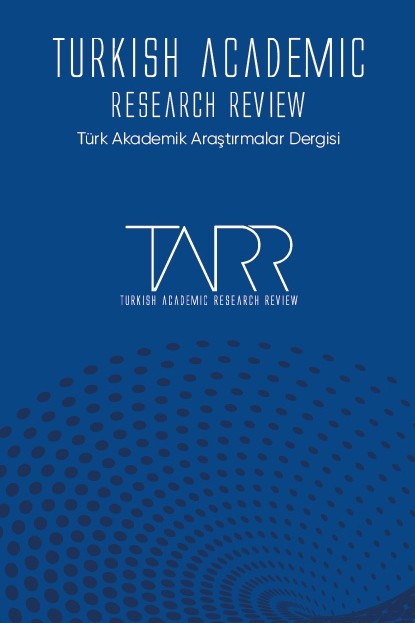Medya ve Teknoloji Kullanımı ve Tutumunda Bilişsel Stiller
Teknoloji geliştikçe insanlar cihazlarla fazla zaman geçirmeye başladı. Günlük yaşamda teknolojinin giderek yaygınlaşan kullanımları teknoloji ve teknoloji bağımlılığı konuları hakkında yeni çalışmaların yapılmasını tetiklemiştir. Kişisel bir özellik olarak da değerlendirilmeye çalışılan bilişsel stil, yaşamın her alanında bireysel davranışları etkilemiştir. Günümüzde medya ve teknolojinin artan kullanımına paralel olarak, bu kişisel özelliğin medya ve teknoloji kullanımını nasıl etkilediği konusu ilgi çekmeye başlamıştır. Aslında insanların teknolojiyi kullanma şekilleri, bilişsel stillerini gösterir ya da onlardan etkilenir. Burada belirtilenlerden yola çıkılarak, bu çalışma, üniversite öğrencilerinin bilişsel stilleri ile teknoloji ve medya kullanımı ve medya ile ilgili tutumları arasındaki ilişkiyi belirlemeyi amaçlamaktadır. Katılımcılar sosyal bilimler bölümlerinden (psikoloji, sosyoloji ve felsefe bölümlerinde okuyan toplam 94 öğrenci) ve Bilgisayar Teknolojisi ve Bilgi Sistemleri (toplam 74 öğrenci) bölümündendi. Toplam 171 katılımcının 94'ü kadın, 77' si erkekti ve yaşları ise 19 ile 27 arasında değişiyordu (yaş ortalaması = 21.08; ss = 1.35). Katılımcılara bir bilgisayarda Bilişsel Stil Analizi (BSA) testinin bir formu verilmiş ve hemen ardından medya ve teknoloji kullanımı ve tutumları ölçeğini tamamlamaları istenmiştir. Analizler değerlendirildiğinde elde edilen sonuçlara göre sosyal bilimlerdeki bölümlerde (psikoloji, sosyoloji ve felsefe bölümlerinde) okuyan öğrencilerin sözel bilişsel stili kullanmaya, Bilgisayar Teknolojisi ve Bilgi Sistemleri bölümünde okuyan öğrencilerin ise görsel bilişsel stili kullanmaya daha fazla yöneldikleri görülmüştür. Ayrıca analitik bilişsel stili kullanmaya eğilimi olan katılımcıların, holistik bilişsel stili kullanmaya eğilimi olanlara göre daha fazla sosyal ağ arkadaşına sahip oldukları görülmüştür. Bulgular genel olarak değerlendirildiğinde, analitik bilişsel eğilimin medya ve teknoloji kullanımında sosyalleşme eğilimi ile ilişkili olduğunu, holistik bilişsel eğilimin ise bireysel eğilimlerle ilişkili olduğunu göstermektedir.
Anahtar Kelimeler:
Medya ve teknoloji kullanımı, analitik bilişsel stil, holistik bilişsel stil, sözel bilişsel stil, görsel bilişsel stil
Cognitive Styles on Media and Technology Usage and Attitude
People began to spend more time with devices as technology developed. The increasingly widespread use of technology in daily life has triggered new studies on this subject. Evaluated as a personal attribute, cognitive style affects individual behavior in all aspects of life. Nowadays, in parallel to the increased use of media and technology, it has become of interest how this personal attribute affects the use of media and technology. Actually, the ways people use technology indicate or affected by their cognitive styles. This study aims at determining the relationships between the cognitive styles of university students and the manners they use technology and media. The student participants were selected from social science departments (total of 94 students from the departments of psychology, sociology, and philosophy) and the Computer Technology and Information Systems (CTIS) department (total of 74 students). Of the 171 participants, 94 were female and 77 were male and their ages ranged from 19 to 27 (mean = 21.08; sd = 1.35). The participants were given a parallel form of the Cognitive Style Analysis (CSA) test on a computer and then were asked to complete the media and technology usage and manners scale. According to the results of analyses, social science students were found to be leaning towards verbal cognitive style, whereas the CTIS students tended to the visual cognitive style. In addition, the participants with the analytic cognitive style preference were found to have more social network friends than those who leaned towards the holistic cognitive style. Overall findings indicate that analytic cognitive style is associated with tendency to socialize in using media and technology, whereas the holistic cognitive style is associated with individualistic tendencies.
Keywords:
CSA media and technology usage, holistic cognitive style, analytic cognitive style, verbal cognitive style, visual cognitive style,
___
- Allen, K.A., Ryan, T., Gray, D.L., Mclnerney, D.M. and Waters, L. (2014). Social media use and social connectedness in adolescents: The positives and the potential pitfalls. The Australian Educational and Developmental Psychologist, 31, 18–31, DOI: 10.1017/edp.2014.2.
- Aslan, H., Aslan, A., Dinc, D. and Yunluel, D. (2018). Testing the reliability of CSA test on a sample of Turkish population. International Journal of Scientific and Technological Research, 4(9), 27-31.
- Çepni, O., Palaz, T. and Ablak, S. (2015). Examining prospective social sciences teachers’ level of media and television literacy according to different variables. Turkish Studies, 10(11), 431–446, DOI: 10.7827/TurkishStudies.8464.
- Internet World Stats. Usage and population statistics, (2017). Available online: http://www.internetworldstats.com/stats.htm (accessed on 21 April 2019).
- Örücü, E. and Yıldız, H. (2014). The Personal Internet and Technology Usage at the Workplace: Cyberslacking. Journal of Ege Akademic Review, 14(1), 99-114. Retrieved from http://dergipark.org.tr/eab/issue/39924/474246.
- Özgür, H. (2016). Adapting the Media and Technology Usage and Attitudes Scale to Turkish. Educational Sciences: Theory & Practice, 16, 1711–1735, DOI: 10.12738/estp.2016.5.0085.
- Peterson, E.R., Deary, I.J., Austin, E.J. (2003). The reliability of Riding’s Cognitive Style Analysis test. Personality and Individual Differences, 34: 881 – 891, DOI: 10.1016/S0191-8869(02)00116-2.
- Riding, R. (1991). Cognitive Style analysis—CSA administration. Brimingham: Learning & training and technology.
- Rosen, L.D., Whaling, K., Carrier, L.M., Cheever, N.A., Rokkum, J. (2013). The media and technology usage and attitudes scale: An empirical investigation. Computers in Human Behavior, 29(6), 2501–2511, DOI: 10.1016/j.chb.2013.06.006.
- Schmeck, R.R. (1988). Learning strategies and learning styles. Springer, Boston, MA.
- Turkish Language Society. Turkish Dictionary. Turkish Language Society Publications of the High Council of Culture, Language and History, 11. Edition, Ankara (2011).
- Turkish Statistical Institute, (2016). Information and Communication Technology (ICT) Usage in Households and by Individuals Innovation Statistics. Available online: http://www.tuik.gov.tr (accessed on 21 April 2019).
- Yayın Aralığı: Yılda 4 Sayı
- Başlangıç: 2016
- Yayıncı: Mehmet ŞAHİN
Sayıdaki Diğer Makaleler
Alkol Bağımlılığıyla Baş Etmede Manevi Bakım İhtiyaçlarının Belirlenmesi
Gültekin AKENGİN, Meral BÜYÜKYAZICI, Tarık DEMİR
İslam Muhakeme Hukukunda Dava Şartları ve Dava Harcının Bu Bağlamda Değerlendirilmesi
Muhammed Selim TOKOĞLU, Zeki YAKA
Tasavvufta Rüya ile Amel ve Fıkıh Usulü Açısından Değerlendirilmesi
Hinduizm ve İslam Arasında: Şirdi Sai Baba Örneği
Tasavvufi Düşüncenin Bağımlılığa Bakışı
Osmanlı Toplumunda Tütün Bağımlılığına Karşı Bir Sosyal Sorumluluk Örneği: Risâle Fi’d-Duhân
Ömer Faruk TEBER, Muzaffer TAN
Türkiye’de Sosyal Medya Bağımlılığı ve Kullanımı Araştırması
